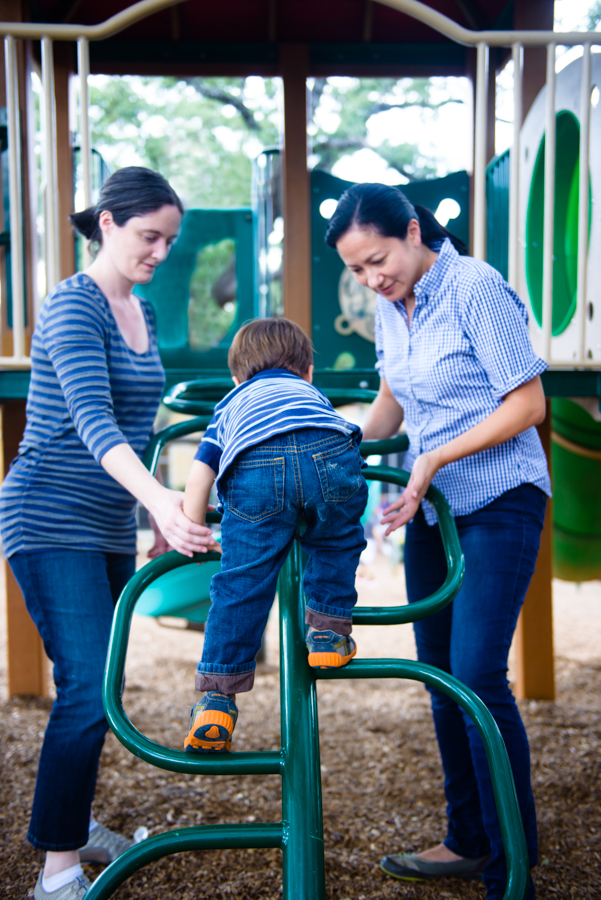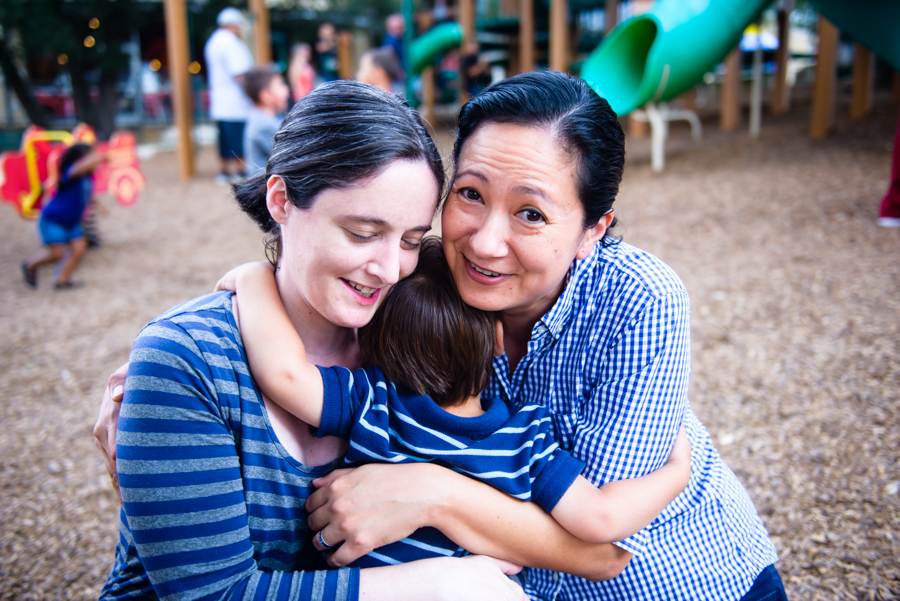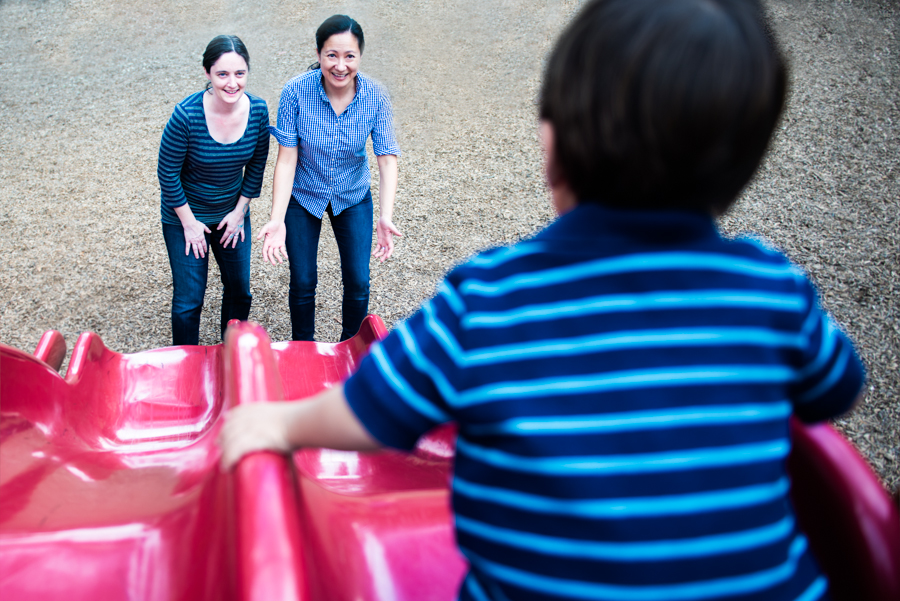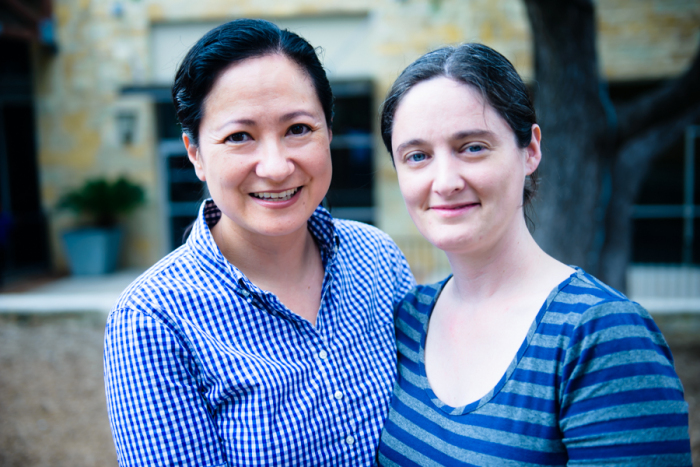Keeping up with the status on gay marriage in the United States almost requires a law degree, a spreadsheet, and a Google alert.
Or you can just visit with Cleo DeLeon and Nicole Dimetman, one of the two Texas couples who are plaintiffs in the 2013 case against the state. (Incidentally, the former uses spreadsheets as a biostatistician; the latter has a law degree and creates Google alerts in her digital marketing business.) Cleo and Nicole eloped to Boston in 2009 and are suing to have their marriage recognized in Texas. The other couple, Mark Pharris and Vic Holmes of Plano, are suing for the right to marry.
They have faced an uphill battle. Texas has done everything it can to block same-sex marriage within its borders. In 1997, the state legislature added language to the Family Code chapter of the State Constitution prohibiting marriage licenses to be given to “persons of the same sex.” In 2003, the state also banned civil unions and declared civil unions and marriages performed in other states to be void here. Completing the trifecta, voters in 2005 passed Texas Proposition 2, which again amended the State Constitution to ban same-sex marriage.

Photography by Devaki Knowles
In the same year, Massachusetts became the first of a slow trickle number of states to allow such unions. And then came the momentum crescendoed with three landmark Supreme Court moves in the past 17 months. First, it struck down DOMA in one ruling, and in another allowed a lower court’s strike-down of California’s Prop 8. Then on Oct. 6, 2014, it declined to hear appeals on cases in which the 4th, 7th and 10th circuits struck down state bans, setting off a flurry of action during which marriage equality almost doubled in two days. However, on Nov. 6, the 6th Court of Appeals broke ranks and upheld state bans within its jurisdiction, almost assuring the Supreme Court’s proactive involvement sooner rather than later.
Currently, same-sex marriage is legal in 32 states and Washington D.C. Of the remaining states, the path for legalization has been cleared for three, and six others—including Texas—are waiting to see if a Federal Appeals Court upholds a lower court’s ruling to overturn the ban.
In the second trimester with the couple’s second child (and first girl), Nicole fielded most of the questions while Cleo, who carried their son (now two years old), balanced enjoying his fun on the playground while engaging in the conversation at opportune times.
The Supreme Court’s inaction last month was a watershed moment for marriage equality. What was your reaction?
Nicole: We were preparing that day to file a motion to expedite, which basically said: “Fifth Circuit, please do this as quickly as possible. I’m pregnant, and there comes a time when traveling to Louisiana becomes not a super idea for me.” We were going back and forth, making a couple of changes, and then all of a sudden I get an alert. In those initial moments, we were like, “Wait! What does this mean?” We were just overjoyed for all of those people. Our filing would not have been a big deal in terms of media attention, but because of what the Supreme Court did, everyone wanted to talk to us.
Cleo: It’s just further evidence—there’s a lot of speculation, but time and again it seems like we’re on the winning side.
Give us a recap of the timeline of your case.
Cleo: We started talking with Nicole’s old law firm [Akin Gump Strauss Hauer & Feld] in August, after DOMA and Prop 8, and filed suit on Oct 26, 2013. Judge [Orlando] Garcia had the hearing on Feb. 12 and ruled on Feb. 26 that the ban is unconstitutional. It violates equal protection. They stayed the decision [pending the decision of the state’s appeal], and we’ve been going through the briefing schedule. We’ve finished our briefs, and the state filed their reply brief a week or so ago.
Nicole: We specifically asked [in the motion to expedite] that the case be heard in November. They said yes, but they didn’t give us a date. [Since this interview, the court postponed the hearing until January.]
But they could take any amount of time to decide. They could take a year to decide.

Photography by Devaki Knowles
When did you decide you wanted to get married?
Nicole: We’ve been together since 2001, and we’d been talking about it for a really long time, but it wasn’t legal in Texas. A lot of people have destination weddings, but it never really appealed to us. Some people always get left out. So we basically waited until we couldn’t anymore. We wanted to have kids, and we didn’t want to have kids or even try to have kids before we were married. So we went to Boston and got married in September of 2009.
Why was getting married important to you?
Nicole: Traditionally you get married before you have kids. We figured our kids might be called all kinds of names or treated differently because they have two moms. We were like, “Well, this is one we can just take off the table. He’s not a bastard.” Boom. Easy peasy.
Cleo: And how scary the process is of having a kid without a second-parent adoption.
Nicole: Delivery is not a riskless procedure. Cleo had this really long, protracted labor, and eventually complications led to an emergency C-section. So even though we had lined up the lawyers and all the paperwork beforehand, we weren’t really protected. There’s always a lapse, and the lapses always happen during some of the most important times. You can file all of your paperwork, but you can’t actually adopt the kid until you get in front of the judge, and the judge isn’t going to show up to the delivery room. There was nothing in that hospital that was making me anybody to our son, even though he was conceived inside of our marriage. So basically he would have been an orphan.
“We might be one that ends up at the Supreme Court, and at that point, they’ll make a sweeping decision.”
How has this impacted your daily lives, and where do you find the strength to deal with it all?
Nicole: The hard thing is, you don’t have any predictability as to how in demand you’re going to be. We want to be available, because the more we tell our story, the more our story gets out there, especially with local news. These are not all people who agree with us. It’s not like we’re on MSNBC. There are people who’ve never met a gay family. I’m not saying seeing us on TV is going to normalize it in an instant, but at least it’s some exposure.
But you believe it’s worth taking the time because it will eventually make a difference.
Nicole: Exactly. But we both have jobs, so it can be a bit of a challenge. It’s more complicated to do this [interview] now than at night after he is asleep, and we have very, very strict rules on his privacy. But during the day when he’s in day care, it’s more complicated because of work. It’s hard to juggle. It can be stressful, but you just have to go with it.
You recently gave a keynote in October here in the Austin area at the PFLAG Southern Regional Conference. What was your message?
Nicole: When you come out, you can be self-involved. Now that we’re parents, we can kind of see it from the other side. It’s hard to try to parent something that you’re not. Other minorities don’t have that problem. In Hispanic families, it’s not like your kid comes to you and says, “I’m Hispanic.” But we’re in this different situation. There are a lot of fears and maybe a mixture of shame. And parents have their own coming out process.
Cleo: You have to come up with a way to work together and bring everybody along.

Photography by Devaki Knowles
Nicole: We also asked people to participate. Whenever you see injustice, however small, you should do something about it. You should brag about your kids. You should talk about them. Don’t have a conversation and leave stuff out because your children are gay and you’re in mixed company.
Cleo: If you have some fears and reservations about talking about it in an every day kind of way, maybe you need to talk about that with somebody or try to come to terms with it.
Nicole: Just talk about it. The movement started a long time ago, but people weren’t really coming out to their parents while they were still living at home. Those conversations are probably one of the keys to why the movement has progressed so quickly.
How do you see your case playing out?
Nicole: It could go one of two ways. If they uphold the ruling—even if Texas were to file an appeal—I would expect the Supreme Court to do what they’ve done in every other circuit case: deny the stay, and marriages would be able to occur immediately. Or they say, “I think the ban is OK.” At that point, based on remarks by Supreme Court Justice Ruth Ginsburg—they’re looking for a case that is contrary to the current trend. If we’re that case that says no, then we might be one that ends up at the Supreme Court, and at that point, they’ll make a sweeping decision.
Interview by Jana Hunter





































